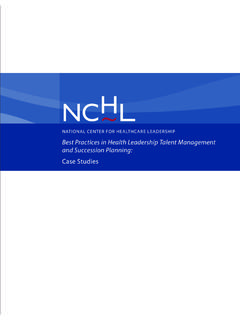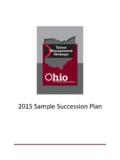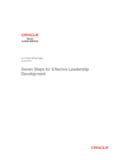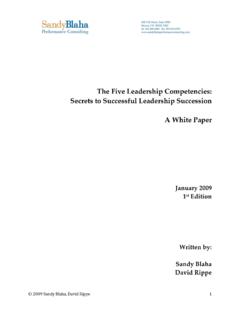Transcription of workforce planning Capturing the Lessons of Experience ...
1 FEBRUARY 2004|10|IPMA-HR NEWSThe world faces a quiet crisis of aging. (See Figure 1.) While that topicis not as dramatic as the war on terrorism, its implications may bemore profound. At the moment, the number of people opting forretirement has remained manageable, probably because pensions havebeen heavily invested in poorly performing mutual funds. But as the stockmarket improves, many organizations may face a retirement tidal wave thatcatches them off guard. Even now many organizations are scurrying to put intoplace succession management programs to help them prepare a new generationat every organizational , as decision-makers ponder how toprepare for many people retiring at once,they face a related problem: How can theypreserve the institutional memory of long-service workers and transfer that knowl-edge?
2 Without paying attention to that,many organizations may find themselves illequipped in the future to perform routine let alone mission-critical what is this problem? What strategiesmay be used to solve it? This articleaddresses these theProblemHow can organizations store and transferthe Lessons learned from their most experi-enced workers before they retire? That isthe question of the moment for manypublic sector employers. To cite just twoexamples: How can a government agency that is responsible for building and main-taining highways preserve the special knowledge necessary to repair bridgeswhen all of its engineers are eligible for retirement?
3 How can a hospital provide uninterrupted health services when all the doctorsin the rural community who have specialized in childbirth are nearing retire-ment?Possible Strategies for Knowledge Storageand TransferSo,what strategies should an organization undertake to store and transmit theinstitutional memory that is often vested in its most experienced performers? Toaddress this challenge, many organizations have formed special task forces. Thesetask forces may suggest that several strategies should be used, including 1: Job-Shadowing Programs. A job-shadowing program is onestrategy by which to transfer knowledge from one person or group to another.
4 Aless-experienced performer is paired up with a veteran performer. The veteran isasked to share knowledge (and perhaps hands-on practice) in dealing with themost difficult situations with which he or she has been faced on the 2: Communities of Practice. A community of practice is a group thatcomes together to share information about a common problem, issue or topic. Suchcommunities may meet in personor online. It is a way by which tostore and transmit knowledge fromone person (or a group) to anotherperson or 3: ProcessDocumentation. Popular as aresult of ISO and the qualitymovement, process documenta-tion involves flowcharting howwork is performed.
5 It may includespecial variations in whatperformers should do or how theyshould do it based on specialcircumstances. Clear processdocumentation, which mayinclude flowcharts or proceduremanuals, can be helpful in storingand transferring knowledge froma more experienced to a less expe-rienced 4: Critical IncidentInterviews or described in the 1950s, thecritical incident method takes itsname from tapping the Lessons of Experience . A critical incident is a difficult(critical) situation (incident). By documenting the Lessons of Experience from theorganization s most experienced performers, the organization can capture thefruits of Experience .
6 Of course, by documenting such difficult cases and howthey were handled the organization is also laying the foundation for the devel-opment of a manual or automated expert system. Critical incidents provide anexcellent foundation for training. An example of a possible questionnaire that isdesigned to capture critical incidents appears in Figure 5: Expert Systems. An expert system, usually automated, is organ-ized around problems and how to troubleshoot them. A simple example is the context-sensitive help on most word processing programs. (If you should evercall in to the help desk of a major computer company for help, the person on theother end of the phone is probably equipped with an expert system.)
7 CommonCapturing the Lessons of Experience : Knowledge Transfer:12 Strategies for SuccessionManagementBy William J. Rothwell, , SPHRCONTINUED ON PAGE 11workforce planning workforce planning workforce planning workforce planning Figure 1: Average Annual Percent Growth of ElderlyPopulation in Developed and Developing CountriesSource:Kinesella, K., & Velkoff, V. (2001).An aging world: P95 , DC: Government Printing Office, p. Growth|||||| ||||1950 1960 1970 1980 1990 2000 2010 2020 2030 2040543210 Developing Countries, 65 Years and OverDeveloped Countries, 65 Years and OverTotal World, All AgesFEBRUARY 2004|11|IPMA-HR NEWSK nowledge Transfercontinued from page 10or difficult problems are logged into the system.
8 Advice about troubleshootingand solving those problems is also provided in the system. This approach, whilerequiring more technological sophistication, places information at the fingertipsof even the least experienced performer, giving him or her the ability to performlike a 6: Electronic Performance Support Systems (EPSS). Perhapsmost sophisticated of all methods for storing and transferring knowledge is a so-called electronic performance support system (EPSS). An EPSS combines artifi-cial intelligence, an expert system, real-time e-learning methods, and acomputer-based referencing system.
9 As a user encounters a problem, he or shecan access all organizational policies and procedures through the referencingsystem, gain advice from past Experience from the expert system, and even learnin real time using the training 7: Job Aids. A job aid is anything that helps peopleperform in real time. A checklist is a job aid. So is a sign. Knowledgecan be stored in the job aid and accessed through low-tech methodsby performers when the need 8: Storyboards. A storyboard is literally a group ofpictures that tell a story. Think of a series of pictures placed on a wallor a poster that is intended to show how someone should perform in aspecific situation and you get the idea.
10 For instance, if you were tryingto show someone how to perform the Heimlich maneuver, you couldstoryboard it. The same technique can be applied to other proceduresto provide a graphic representation of what to do and how to do , storyboards can be used in storing and transferring 9: Mentoring Programs. A mentor is an experiencedperformer; a mentee is a less-experienced one. Rarely is a mentor asupervisor, since effective mentors should usually have no selfishinterest in the development of another person. Successful people haveusually had one or more mentors in their career, and mentors offeradvice on what to do, how to do it and why it is worth doing in a situ-ation.










